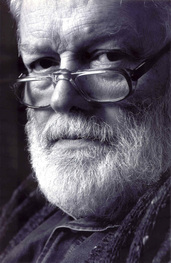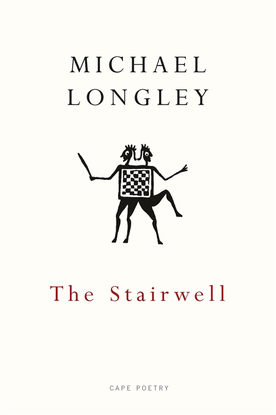RUSTY TALK WITH MICHAEL LONGLEY Michael Longley Michael LongleyPhoto credit: Kelvin Boyes Michael Longley was born in Belfast in 1939. He has published nine collections of poetry including Gorse Fires (1991) which won the Whitbread Poetry Award, and The Weather in Japan (2000) which won the Hawthornden Prize, the T.S. Eliot Prize and the Irish Times Poetry Prize. In 2001 he received the Queen’s Gold Medal for Poetry and in 2003 the Wilfred Owen Award. He was awarded a CBE in 2010 and was Ireland Professor of Poetry, 2007-2010. Catherine Graham: Congratulations on winning the Griffin International Poetry Prize for your tenth collection, The Stairwell (Cape Poetry). Like a stairwell, this book contains poems of passages—birth and death, childhood and old age, conflict and peace. During your acceptance speech you mentioned that you’ve been writing since you were 15. Was there a moment when you realized you were a poet or was it something that just built up over time? Michael Longley: It built up over time. I feel very superstitious about calling myself a poet. It’s what I most want to be. CG: The Stairwell consists of twenty-three elegies for your twin brother, Peter. Homer’s Iliad also permeates the collection. I wondered if you could talk more about how this book came into being. ML: I was with Peter when he died. At the time I wondered if I would ever be able to write an elegy for him. I ended up writing twenty-three. I gathered them into the second half of the book as a sustained lamentation. As so often in the past Homer came to my rescue and helped me to find the words. In some of the poems in the first section I celebrate grandchildren, and that lightens the elegiac tone a bit. Arrivals and departures. CG: When you were a student at Trinity your first poem “Marsh Marigolds” was published in a literary magazine called Icarus: She gave him marigolds The first three lines are weaved into “Marigolds, 1960” uniting the young poet you were with the experienced poet you became. It’s one of my favourites in The Stairwell. Can you tell us more about this poem and/or the process behind it? ML: The poem was published in the Trinity College literary magazine Icarus at Easter 1960. Although I didn’t realise it at the time, my father was dying. He discovered the poem and told me it wasn’t worth the paper it was printed on. He was right of course, but he shouldn’t have said that. In ‘Marigolds 1960’ I forgive him his frankness, but much more importantly I grieve for him and suggest that at the end we were drawing closer together. It pleases me that my juvenile verse helped me in my seventies to frame an elegy for my father. CG: You have said at this point in your writing life you have “all the tools for producing forgery and it’s important not to.” What constitutes forgery for you? ML: Faking emotions. Imitating yourself. Pretending you have something to say when you haven’t. Passing off five-finger exercises as true art. Silence is infinitely preferable to such shams. Indeed, silence is part of the enterprise. CG: Who were some of your early influences? ML: Walter de la Mare, Keats, e.e. cummings, Louis MacNeice, Auden, Yeats, Wilfred Owen, Edward Thomas, Hart Crane, Dylan Thomas, Richard Wilbur, D.H. Lawrence, Theodore Roethke. I was quite promiscuous. CG: What are some of the biggest changes you’ve seen in the world of poetry since you started? ML: The word processor and the way it encourages you to mistake garbage for the real thing. The Creative Writing industry and the retreat of poetry into academe. A good poem is just as rare an event as it always has been. CG: Can you share some of the highlights of your Griffin experience? ML: Meeting my fellow poets and sharing with them the nervy excitement of it all. Being charmed and impressed by Scott Griffin and reassured by his marvellous staff. Not expecting to win and then winning. Phoning my wife in Belfast to give her the good news. The bigheartedness of the whole enterprise. The vision and the details. CG: What’s next for Michael Longley? ML: I have written about half a new collection of poems. I am also putting together a selection of my prose – essays, lectures, introductions, articles, reviews. And I am working on a memoir – before I forget everything . . . MICHAEL LONGLEY'S MOST RECENT BOOK |
Rusty Talk
Rusty Talk Editor: Archives
November 2017
Categories
All
|


 RSS Feed
RSS Feed
